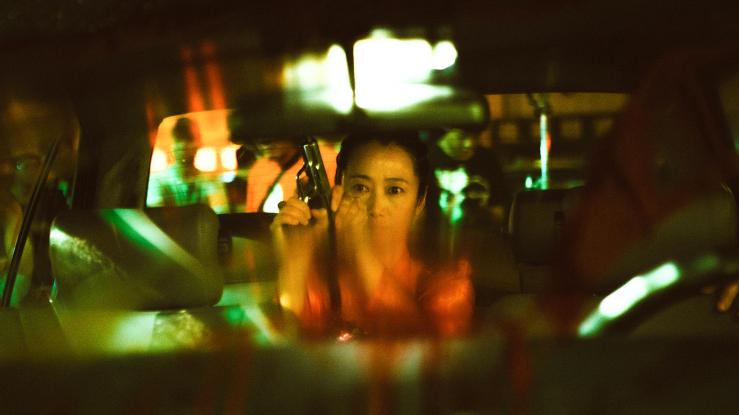Released: 2018 Viewed: May 2019

Jia Zhangke has been one of the most interesting and inventive Chinese directors since his debut in 1997 with Xiao Wu (also known as Pickpocket). However, his recent films have seen a downturn in form with the very disappointing Mountain may depart (especially the awful final section) while his short film The Hedonists simply rehashed themes he had done better before. Unfortunately Ash is Purest White does not mark a return to form.
The film starts in 2001 in Datong, Shanxi province where Zhao Tao (yet again asked to play a character way below her actual age) is Qiaoqiao the girlfriend of small time Jianghu gangster Guo Bin (Liao Fan, same). Qiaoqiao uses a gun to save Bin from a rival gang which leads to a prison sentence of five years. Meanwhile Bin, after a shorter sentence, disappears. Five years later, in scenes which could have been taken from Still Life, Qiaoqiao is on a boat near the Three Gorges searching for Bin. When she finds him, he has obviously moved on but Qiaoqiao (for reasons that are less than obvious) takes some convincing that he is a useless waster who is best avoided.
When she eventually does decide to leave, she takes a train and meets a talkative man who claims (very unconvincingly) to be setting up a tourist business to visit UFO sites in Xinjiang. She takes up his offer of a non-existent job with this non-existent business, thinks better of it and sees a UFO.
Finally, a decade later, she is back in Datong. Datong is looking much improved but Bin (also returned) is quite the opposite and is now confined to a wheelchair. His personality has also not improved. Although Qiaoqiao (with Zhao finally playing her own age) admits that she no longer has any feelings for him, she (again for reasons which are less than obvious) takes care of him and helps him to rehabilitate. He leaves. Film ends.
Yet again we have a film, over an extended period of time, rehashing themes (such as industrial decline) which Jia has done (much) better before. Frankly the point of this film is a mystery to me. Insofar as it suggests a commentary on changes in Chinese society over the last decades, it only tells us the blindingly obvious: the trains have changed and more people go to university. Its reference to the criminal world (Jianghu) and its codes is similarly superficial. The Chinese title (Children of the Jianghu) makes only slightly more sense than the English one.
The film looks well and Zhao Tao does her best to breathe life into her character. But she is not helped by the fact that, despite being the main character, she is only seen in relation to the men around her. Liao Fan (Black Coal, Thin Ice) is faced with a challenge of making his unlikable character even vaguely sympathetic, one which he seems to have given up as a bad job.
86 on Metacritic, 7.1 on IMDB, this scored an unexceptional 7.6 on Maoyan and Duoban though it has taken in over $10 million at the box office (101 out of 425 films in 2018).
Sadly, director Jia seems to be stuck in a rut, repeating the same old tropes with nothing new to say. Hopefully he will soon return to his earlier inspiration.

[…] and nuanced manner and is much more effective than, for example, the most recent work of Jia ZhangKe. However, and perhaps inevitably, we have seen many of the topics (mass layoffs, forced abortion, […]
LikeLike